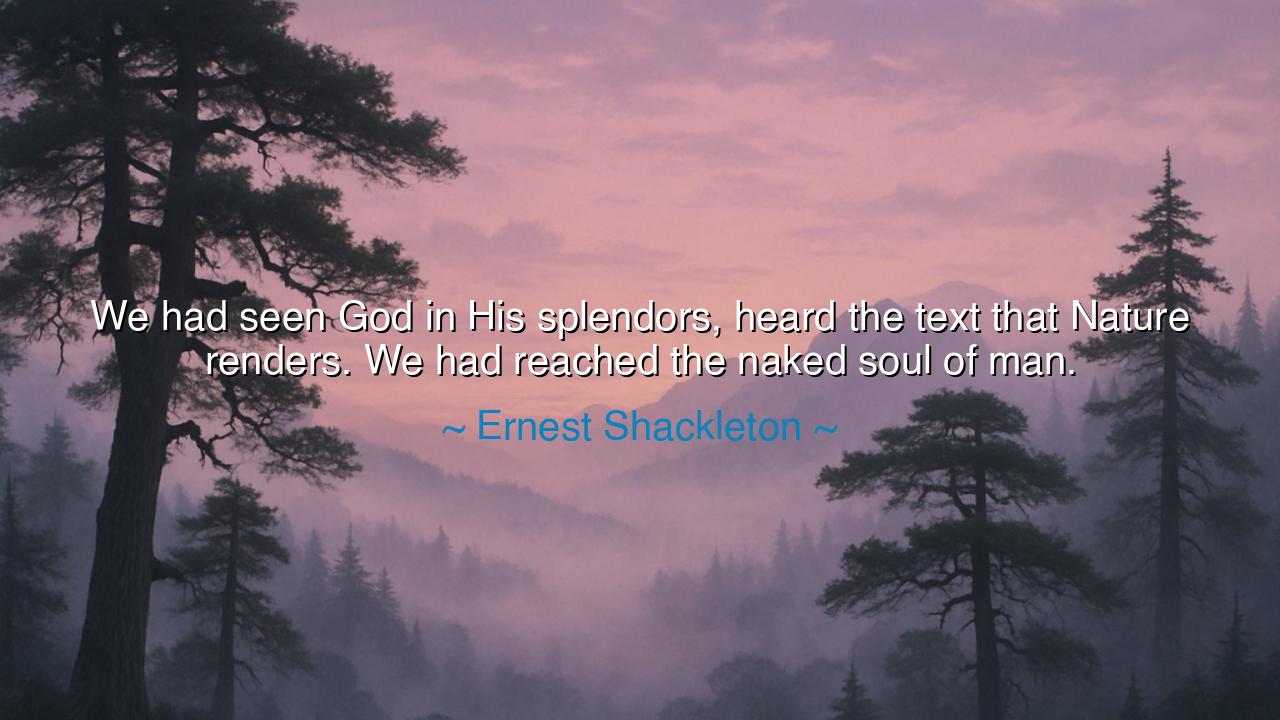
We had seen God in His splendors, heard the text that Nature
We had seen God in His splendors, heard the text that Nature renders. We had reached the naked soul of man.






“We had seen God in His splendors, heard the text that Nature renders. We had reached the naked soul of man.” Thus spoke Ernest Shackleton, the heroic explorer of the Antarctic, who endured the crushing ice, the howling winds, and the desolation of the world’s most merciless frontier. In this utterance, he captured not merely the record of a voyage, but the revelation of existence itself. These words are no idle description; they are the testimony of men stripped of all illusions, who in facing the immensity of Nature uncovered both the grandeur of the divine and the fragility of the human soul.
To see God in His splendors is to look upon the majesty of creation in its purest form. Shackleton and his crew, far from the comforts of cities, gazed upon icebergs like cathedrals, auroras like celestial choirs, and seas as fierce as judgment. Here, there was no need for carved altars or written scriptures—the very sight of nature in its raw, unyielding power was revelation enough. In those frozen wastes, Nature herself became the holy text, declaring the eternal truths of endurance, humility, and awe.
The phrase “the naked soul of man” speaks to the stripping away of every mask, every pretense. In the Antarctic, men could not hide behind wealth, rank, or vanity. Hunger, cold, and fear rendered all equal, exposing the core of what it means to be human. Shackleton saw that when survival is at stake, the essence of man is revealed—not the polished manners of society, but the bare will to live, the courage to endure, and the capacity to sacrifice for one another. This was not degradation, but purification: humanity laid bare, yet ennobled.
Consider the real story of Shackleton’s Endurance expedition. When his ship was trapped and eventually crushed by ice, he and his crew were cast into one of the harshest environments on Earth. For months they drifted on the floes, sailed in lifeboats through stormy seas, and marched across barren landscapes. Yet through it all, not one life was lost. Shackleton’s leadership, and the men’s shared strength, revealed the triumph of spirit over circumstance. In their suffering, they encountered not despair but revelation—an encounter with the very naked soul of man.
History shows other parallels. When Leonidas and his three hundred Spartans stood at Thermopylae, stripped of all hope of victory, they too revealed the naked soul of man—the courage to face death with honor. When Nelson Mandela endured decades in prison, separated from freedom, he reached into the depths of his soul and found there not bitterness but the power to forgive and to lead. Shackleton’s words join this chorus of examples: that in extremity, man may lose all outward trappings, yet discover the eternal flame within.
The lesson of Shackleton’s words is clear: do not fear the stripping away of comfort, for it is often in hardship that we encounter the splendor of God and the truth of ourselves. Luxury may lull us, but trial awakens us. When life removes what is superficial, it leaves us with what is eternal—the soul, raw and honest, standing before creation. This is not a call to seek suffering for its own sake, but to embrace it when it comes, knowing that it may reveal depths we did not know we possessed.
Therefore, dear listener, take these words as a torch for your journey. When you face hardship, do not curse it, but ask what it reveals. Look upon Nature—in the mountain, in the storm, in the sea—and see the divine splendor reflected there. When you are stripped of pride, wealth, or certainty, know that you stand nearer to truth, nearer to the essence of humanity. Live with courage, endure with dignity, and help others to do the same. For in doing so, you too may reach, as Shackleton did, the naked soul of man, and discover there not despair, but glory.






AAdministratorAdministrator
Welcome, honored guests. Please leave a comment, we will respond soon